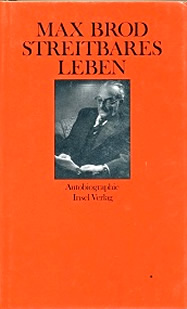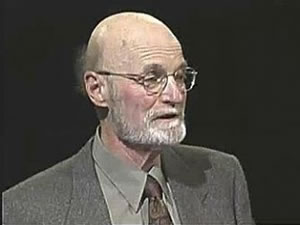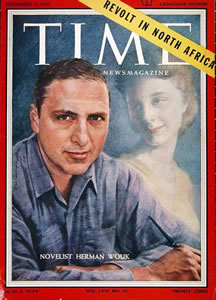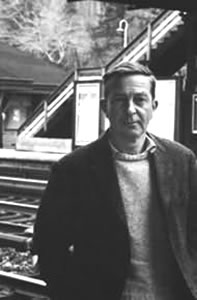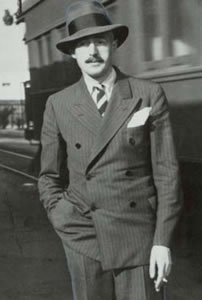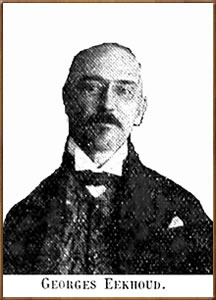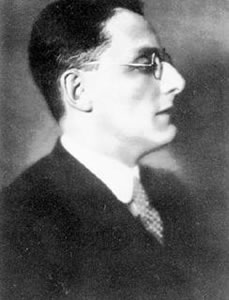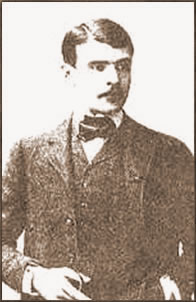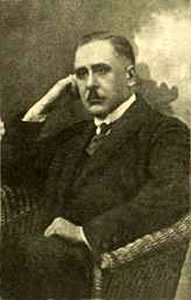De Tsjechisch-Israëlische dichter, schrijver, criticus en componist Max Brod werd geboren in Praag op 27 mei 1884. Zie ook alle tags voor Max Brod op dit blog.
Uit: Lord Byron kommt aus der Mode
„BYRON: Was hast du denn, Göß.
AUGUSTA (böse): Was Fletcher vorhin gesagt hat, als wir kamen. —Daß es hier schon lange nicht so lustig war. — (Aufflammend) Er verwechselt mich wohl mit einer deiner Maitressen!
(Sie wendet sich wütend gegen die Wand. In ihrem Ausbruch, auch in der Stellung erinnert sie jetzt an Byron: 1. Bild, die Szene mit Graf Carlisle, die Stelle vom »Blut der Stuarts«)
BYRON (beschwichtigt sie zärtlich): Auch diese Wut — genau meine Wut. Ich kenne sie genau. Und gleich wirst du wieder gut sein, wie ich.
AUGUSIA (lacht unter Tränen): Du ärgerst mich!
BYRON: Nein. Ich ärgere dich nicht. Das ist es ja eben. Zwischen uns kann nichts Fremdes sein. Wir sind einander zu ähnlich, zu nah. Daher auch dieser himmlische Frieden von dir zu mir. Wir beide können einander niemals enttäuschen. Zwischen uns ist keine Verstellung möglich, kein Zur-Last-fallen, kein Überdruß, keine Falschheit, kein vergiftetes Liebesspiel. Wir wissen einander von vornherein — das ist Geschwisterlichkeit. Etwas Großes. Ich verstehe, warum die Könige Ägyptens es für unvereinbar mit ihrer Würde hielten, eine andere als ihre Schwester zu heiraten. Es ist erhaben, in einem gewissen Sinn kalt, gefahrlos. Es reizt nicht — nur das Fremde reizt. Ich habe dich lieb, Augusta, und doch ist mir noch nie eingefallen, dich zu umarmen, zu küssen.
AUGUSTA (schamhaft und gequält): Sprich nicht davon!
BYRON: Soll ich von all dem —?
AUGUSTA: Von all dem lieber nichts. Es widerstrebt mir. Ich weiß nicht warum.
BYRON (auf und ab): Ach laß doch! (Lebhafter) Es fällt mir eben ein, daß auch einer der Cäsaren mit seiner Schwester vermählt war. Und Napoleon — sagt man –
AUGUSTA (gereizt, da er das Thema nicht abbricht, nun ihrerseits Öl ins Feuer gießend): Mit allen seinen Schwestern.
BYRON: Paolina Borghese.
AUGUSTA: Kein schlechter Geschmack! Aber ich weiß ein Beispiel, das uns näher liegt —
BYRON: Noch näher?
AUGUSTA: Eine alberne Geschichte.
BYRON: Erzähle.
AUGUSTA: Sie ist ziemlich unanständig.“
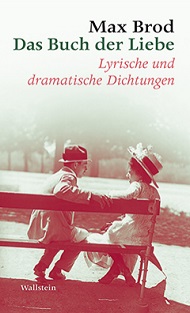
Max Brod (27 mei 1884 – 20 december 1968)
Cover
De Estse schrijver Kaur Kender werd geboren op 27 mei 1971 in Estland. Zie ook alle tags voor Kaur Kender op dit blog.
Uit: Petty God (Vertaald door Edith Epler)
“At first there was nothing on my desk. Under the table were empty drawers and in the ceiling a hole, where, as it later turned out, a chandelier would be fitted.
“Bring me a lamp!” I shouted to the lobby. A lamp was brought. This happened some time ago.
Everything is ready and everything has been planned. And most importantly: everything has been done. I do not have to do anything. The system functions by itself. I just watch and enjoy. Astonishing, I should say, how much I like this. The last thing I hung on the wall was a picture of David Allmighty. Precisely above my desk. I know there is something similar about the two of us. I know that this something stands out. If I had a son, I would put a picture of him there, too. Yes: me, my son and David Allmighty. That would be fun. Regrettably I do not have a son. Here and now. Moreover, there is really no particular need for David Allmighty, but some clients can more easily accept the thought that someone grand and distant creates certain solutions, which they are offered. Many of the moves I have made are ascribed to David Allmighty. But let the people talk.
Now there is only the naming left. I cannot be bothered with that. I will let him name. But before he starts to name, there is one more thing.
He will ask at any moment.
*
“Who else will be in my cabinet?” I ask at last. Everything has been unpacked, everything has been done, but he still hasn’t told me. Well, I shouldn’t stay here alone! He keeps repeating that creative work is a dialogue. Why should I be talking to myself then?
“Sleep, sleep well tonight, because you will have a companion tomorrow,” he grins and scratches his gold Rolex. “
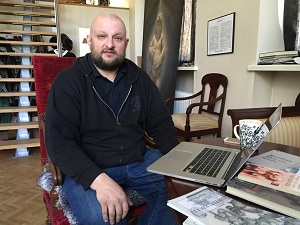
Kaur Kender (Estland, 27 mei 1971)
De Nederlandse journalist, schrijver en kunsthandelaar Adriaan Harrie Venema werd geboren in Heiloo op 27 mei 1941. Zie ook alle tags voor Adriaan Venema op dit blog.
Uit: Schrijvers, uitgevers en hun collaboratie
“Misschien was Mies Bouhuys niet compleet geïnformeerd, want in haar herinneringen noemde ze verschillende bladen waaraan Hoornik meewerkte, op De Nieuwe Gemeenschap na. Het gedicht ‘Stem uit Twente’ publiceert ze wel zonder te vermelden in welk blad het oorspronkelijk gestaan had. Ook De Nieuwe Gids vermeldde ze niet, terwijl Hoornik daar in 1938 in publiceerde op een moment dat Alfred Haighton, een van de ergste antisemieten uit die tijd, het heft in handen nam. De gedichten van Hoornik stonden in het augustus-nummer. Hoornik zou overigens daarna zijn medewerking aan De Nieuwe Gids opzeggen, nadat achtentwintig literatoren hem in een manifest daarin vooraf waren gegaan. Op Haighton en De Nieuwe Gids kom ik in deel ii terug.
Hoornik bleef bij het Algemeen Handelsblad door de jaren heen redacteur binnenland. In de herinneringen van Mies Bouhuys wordt 1939 genoemd als de datum waarop hij aan de kunstredactie ging meewerken99. ‘Op de kunstredactie, waar ik sinds 1939 aan meewerkte’, laat ze Hoornik vertellen, ‘zaten figuren die “fout” waren. Ze wisten natuurlijk precies wie mijn vrienden waren en met hoeveel walging ik nog op die krant werkte, waar de lezers de Duitse overwinningen grootscheeps kregen voorgeschoteld.’
Waar het jaartal 1939 vandaan komt, is onbekend, want pas in 1941 zien we Ed. Hoornik voor de eerste maal genoemd als medewerker van de kunstredactie. Maar toen was het ook gelijk raak. Hij debuteerde als kunstredacteur van het Algemeen Handelsblad met het artikel, waaraan Hermans refereerde100. Ook is het opvallend dat Hoornik tot de kunstredactie toetrad vlak na de eerder beschreven machtsovername bij de krant, een bijzonder ongelukkig moment dus om voor het eerst in de nieuwe cultuurpolitiek aan te schuiven, onder verantwoordelijkheid van nota bene Chris de Graaff, die de fatsoenlijke Maurits Uyldert was opgevolgd, en dan nog wel met een interview waarin Henri Bruning onbekommerd zijn nationaal-socialistische ideeën kon spuien.
Henri Bruning was een fanatieke nationaal-socialist en hij maakte daar ook geen geheim van. Hoornik noemde hem in het interview dat op 31 juli 1941 verscheen ‘een zuivere Nederlander’101, wiens ‘studies over het gezag wel als bijzonder scherpzinnig of indringend gekenmerkt mogen worden’, met recht een opvallende visie op Bruning.”
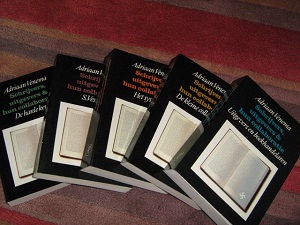
Adriaan Venema (27 mei 1941 – 31 oktober 1993)
De vijf delen van Venema’s “Schrijvers, uitgevers en hun collaboratie”
De Engelse schrijver Arnold Bennett werd geboren in Hanley, Staffordshire, op 27 mei 1867. Zie ook alle tags voor Arnold Bennett op dit blog.
Uit: The Grand Babylon Hotel
“Jules, the celebrated head waiter of the Grand Babylon, was bending formally towards the alert, middle-aged man who had just entered the smoking-room and dropped into a basket-chair in the corner by the conservatory. It was 7.45 on a particularly sultry June night, and dinner was about to be served at the Grand Babylon. Men of all sizes, ages, and nationalities, but every one alike arrayed in faultless evening dress, were dotted about the large, dim apartment. A faint odour of flowers came from the conservatory, and the tinkle of a fountain. The waiters, commanded by Jules, moved softly across the thick Oriental rugs, balancing their trays with the dexterity of jugglers, and receiving and executing orders with that air of profound importance of which only really first-class waiters have the secret. The atmosphere was an atmosphere of serenity and repose, characteristic of the Grand Babylon. It seemed impossible that anything could occur to mar the peaceful, aristocratic monotony of existence in that perfectly-managed establishment. Yet on that night was to happen the mightiest upheaval that the Grand Babylon had ever known.
‘Yes, sir?’ repeated Jules, and this time there was a shade of august disapproval in his voice: it was not usual for him to have to address a customer twice.
‘Oh!’ said the alert, middle-aged man, looking up at length. Beautifully ignorant of the identity of the great Jules, he allowed his grey eyes to twinkle as he caught sight of the expression on the waiter’s face.
‘Bring me an Angel Kiss.’
‘Pardon, sir?’
‘Bring me an Angel Kiss, and be good enough to lose no time.’
‘If it’s an American drink, I fear we don’t keep it, sir.’ The voice of Jules fell icily distinct, and several men glanced round uneasily, as if to deprecate the slightest disturbance of their calm. The appearance of the person to whom Jules was speaking, however, reassured them somewhat, for he had all the look of that expert, the travelled Englishman, who can differentiate between one hotel and another by instinct, and who knows at once where he may make a fuss with propriety, and where it is advisable to behave exactly as at the club. The Grand Babylon was a hotel in whose smoking-room one behaved as though one was at one’s club.”

Arnold Bennett (27 mei 1867 – 27 maart 1931)
Cover
De Duitse dichter en schrijver Richard von Schaukal werd geboren op 27 mei 1874 in Brünn. Zie ook alle tags voor Richard von Schaukal op dit blog.
Mai
Der Flieder am Tor
dringt rötlich hervor,
das himmlische Blau
erduftet im Tau.
Noch blendets vom Blühn,
schon rieselt es grün
und flimmert und bebt,
von Licht überschwebt.
O seliger Mai
und morgen vorbei:
ein trunkener Zug,
ein blitzender Flug!
Entführung
Wenn die leichte Kerzenflamme
Schwelend sich gespenstisch hebt,
Die am runden, weißen Stamme
Zuckend wie gefangen klebt,
Und ein Hauch im düstern Zimmer
Unbemerkt sie plötzlich treibt,
Daß ihr flüchtig blasser Schimmer
Schattend einen Kreis beschreibt:
Fühlst du dich im tiefsten Kerne
Wie von einem Ruf berührt,
Der dich in die große Ferne,
In die Ewigkeit entführt,
Fühlst dich über diesem Leben
Körperfrei im Wirbelwind
Lautlos zu den Quellen schweben,
Daraus die Zeit ins Dunkel rinnt.
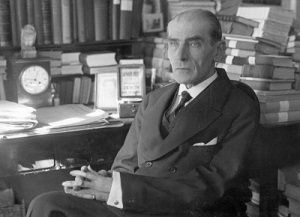
Richard von Schaukal (27 mei 1874 – 10 oktober 1942)
In 1934
De Poolse schrijver, journalist, ontdekkingsreiziger en globetrotter Ferdynand Ossendowski werd geboren op 27 mei 1876 in Dvina. Zie ook alle tags voor Ferdynand Ossendowski op dit blog.
Uit: Beasts, Men And God
„I did not ask him anything further and told him only that I would wait for him. He took off the bags that had been hanging on his saddle, put them away out of sight in the burned corner of the cabin, looked over the stirrups and bridle and, as he finished saddling, smiled and said:
“I am ready. I’m going to awake my ‘comrades.’” Half an hour after the morning drink of tea, my three guests took their leave. I remained out of doors and was engaged in splitting wood for my stove. Suddenly, from a distance, rifle shots rang through the woods, first one, then a second. Afterwards all was still. From the place near the shots a frightened covey of blackcock broke and came over me. At the top of a high pine a jay cried out. I listened for a long time to see if anyone was approaching my hut but everything was still.
On the lower Yenisei it grows dark very early. I built a fire in my stove and began to cook my soup, constantly listening for every noise that came from beyond the cabin walls. Certainly I understood at all times very clearly that death was ever beside me and might claim me by means of either man, beast, cold, accident or disease. I knew that nobody was near me to assist and that all my help was in the hands of God, in the power of my hands and feet, in the accuracy of my aim and in my presence of mind. However, I listened in vain. I did not notice the return of my stranger. Like yesterday he appeared all at once on the threshold. Through the steam I made out his laughing eyes and his fine face. He stepped into the hut and dropped with a good deal of noise three rifles into the corner.
“Two horses, two rifles, two saddles, two boxes of dry bread, half a brick of tea, a small bag of salt, fifty cartridges, two overcoats, two pairs of boots,” laughingly he counted out. “In truth today I had a very successful hunt.”
In astonishment I looked at him.
“What are you surprised at?” he laughed. “Komu nujny eti tovarischi? Who’s got any use for these fellows? Let us have tea and go to sleep. Tomorrow I will guide you to another safer place and then go on.”
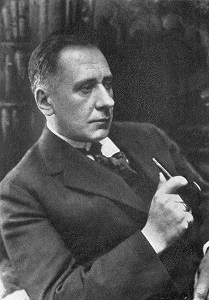
Ferdynand Ossendowski (27 mei 1876 – 3 januari 1945)
De Duitse dichter en schrijver Moritz August von Thümmel werd geboren op 27 mei 1738 in Schönefeld. Zie ook alle tags voor Moritz August von Thümmel en voor August von Thümmel op dit blog.
Elegie auf einen Mops
Das mahnend schöne Bild, das ich mit ihm verloren,
so weit mein Auge reicht, ersetzt kein andres nicht.
Belehrender war nie ein Sonderling geboren,
und keiner trug, bei kürzern Ohren,
ein philosophischer Gesicht.
Zwar sah ich manche Stirn von Königsberg bis Leiden
mit diesem mystischen gelehrten Überzug:
Doch sah ich keine je, die Runzeln so bescheiden,
von allen Wesen zu beneiden,
als meines Mopses Stirne trug.
Er warf den hohen Ernst der kritischen Gebärde
nie auf ein Mitgeschöpf, nie außer sich herum.
Der Schnarcher suchte nie, so weit ihn Gottes Erde
auch trug, dass er bewundert werde,
ein größres Auditorium.
Nur still erbaut’ er mich. Von seinem gelben Felle
blickt’ ich gestärkter auf in die beblümte Flur:
Mein krankes Auge stieg von seiner Lagerstelle
gemach vom Dunkeln in das Helle
bis zu dem Lichtquell der Natur.
Wenn er sich schüttelte, las ich in seinen Blicken
den herrlichen Beweis vortrefflich kommentiert,
den einst, vom Übergang des Schmerzes zum Entzücken,
aus gleicher Notdurft sich zu jücken,
der weise Sokrates geführt.
Kein unbequemer Freund, kein Trunkenbold, kein Fresser,
in richtiger Mensur, nicht stolz, nicht zu gemein,
schlief er sein Leben durch, und wahrlich, desto besser!
er schläferte, wie ein Professer,
auch seinen klügern Nachbar ein.
Wie hast du, guter Mops, nicht meiner Stirne Falten,
sah ich dem Grillenspiel der deinen zu, gegleicht!
Gewarnter nun durch dich, frühzeitig zu veralten,
sei immer dir mein Dank erhalten!
Auch dir sei Gottes Erde leicht!
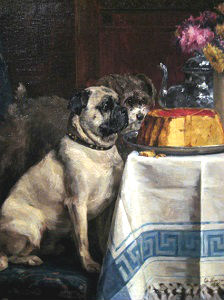
Moritz August von Thümmel (27 mei 1738 – 26 oktober 1817)
„Wilskracht“ door Charles van den Eycken, 1891
De Amerikaanse schrijver Herman Wouk werd geboren op 27 mei 1915 in New York. Zie ook alle tags voor Herman Wouk op dit blog.
Uit: The Hope
“Ha’m’faked!” No response. “Ha’m’faked! Ha’m’fakedr’ (“Commander! Commander!”) The watch sergeant roughly shakes the company commander’s shoulder. Haganah captain Zev Barak, born Wolfgang Berkowitz, rolls over and half opens heavy eyes. “What now?” “Sir, they’re coming again.” Barak sits up and glances at his watch. L’Azazel! Asleep a mere ten minutes, how can he have dreamed such a long crazy dream, himself and his Moroccan wife Nakhama in the Vienna of his boyhood, rowing on a lake, riding a Ferris wheel, eating pastry in a Ringstrasse café? Around him on the ground the militiamen sprawl asleep. Beyond the sandbags and the earthworks rifle-toting lookouts pace the hilltop, peering down at the narrow moonlit highway from Tel Aviv to Jerusalem, which here goes snaking through the mountain pass. Wearily, Zev Barak gets to his feet in a cold night wind. Unshaven, grimy, in a shabby uniform with no insignia of rank, the captain at twenty-four looks barely older than his troops. He follows the sergeant to an outcropping of rock amid scrubby trees, where the sentry, a scrawny boy in a Palmakh wool cap, points down at the road. Barak edges out on the rocks and looks through binoculars at the moving shadows. “All right,” he says, sick at heart, to the sergeant. “Go ahead and wake the men.” Within minutes they stand in a semicircle around him, some thirty tousle-headed youths, many of them bearded, yawning and rubbing their eyes. “It’s a pretty big gang this time, maybe a hundred or so,” he says in a matter-of-fact voice, though he feels that in this fight against odds, after months of close calls, he may really be about to die. He has been hearing that anxious inner voice more than once lately. Here he is still alive, just very worn out and scared, and he must keep up the spirits of these weary hard-pressed youngsters. “But we have plenty of ammunition, and we’ve beaten them off before. This hill is the key to Kastel, so let’s hold our ground, no matter what! Understood? Then prepare for action.” In minutes, Barak’s troops, armed and helmeted, surround him once more. No more yawns now; grim youthful faces under variegated headgear, from World War I tin hats to British and German steel casques, and also some ragged wool caps. “Soldiers, you’re a fine unit. You’ve proven yourselves. Fight the way you did before, and you’ll repulse them again. Remember, the Russians had a motto, ‘If you have to go, take ten Germans with you.’ So if any of us have to go, let’s each take twenty of them with us! We’ve got the high ground, and we’re fighting for our lives, our homes, and the future of the Jewish people.”
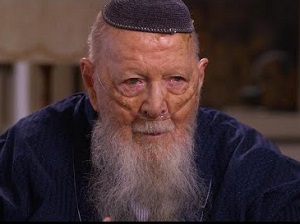
Herman Wouk (New York, 27 mei 1915)
De Amerikaanse schrijver Dashiell Samuel Hammett werd geboren in Saint Mary’s County (Maryland), op 27 mei 1894. Zie ook alle tags voor Dashiell Hammett op dit blog.
Uit: The Maltese Falcon
“No, I haven’t. I wrote her that I would go to the St. Mark, and I begged her to come and let me talk to her even if she didn’t intend to go home with me. But she didn’t come. I waited three days, and she didn’t come, didn’t even send me a message of any sort.”
Spade nodded his blond satan’s head, frowned sympathetically, and tightened his lips together.
“It was horrible,” Miss Wonderly said, trying to smile. “I couldn’t sit there like that–waiting–not knowing what had happened to her, what might be happening to her.” She stopped trying to smile. She shuddered. “The only address I had was General Delivery. I wrote her another letter, and yesterday afternoon I went to the Post Office. I stayed there until after dark, but I didn’t see her. I went there again this morning, and still didn’t see Corinne, but I saw Floyd Thursby.”
Spade nodded again. His frown went away. In its place came a look of sharp attentiveness.
“He wouldn’t tell me where Corinne was,” she went on, hope-lessly. “He wouldn’t tell me anything, except that she was well and happy. But how can I believe that? That is what he would tell me anyhow, isn’t it?”
“Sure,” Spade agreed. “But it might be true.”
“I hope it is. I do hope it is,” she exclaimed. “But I can’t go back home like this, without having seen her, without even having talked to her on the phone. He wouldn’t take me to her. He said she didn’t want to see me. I can’t believe that. He promised to tell her he had seen me, and to bring her to see me–if she would come–this evening at the hotel. He said he knew she wouldn’t. He promised to come himself if she wouldn’t. He–“
She broke off with a startled hand to her mouth as the door opened.
The man who had opened the door came in a step, said, “Oh, excuse me!” hastily took his brown hat from his head, and backed out.
“It’s all right, Miles,” Spade told him. “Come in. Miss Wonderly, this is Mr. Archer, my partner.
Miles Archer came into the office again, shutting the door behind him, ducking his head and smiling at Miss Wonderly, making a vaguely polite gesture with the hat in his hand. He was of medium height, solidly built, wide in the shoulders, thick in the neck, with a jovial heavy-jawed red face and some grey in his close-trimmed hair. He was apparently as many years past forty as Spade was past thirty”.
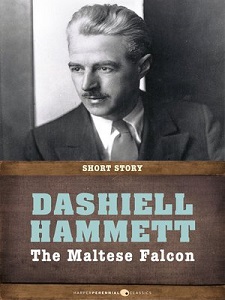
Dashiell Hammett (27 mei 1894 – 10 januari 1961)
Cover

